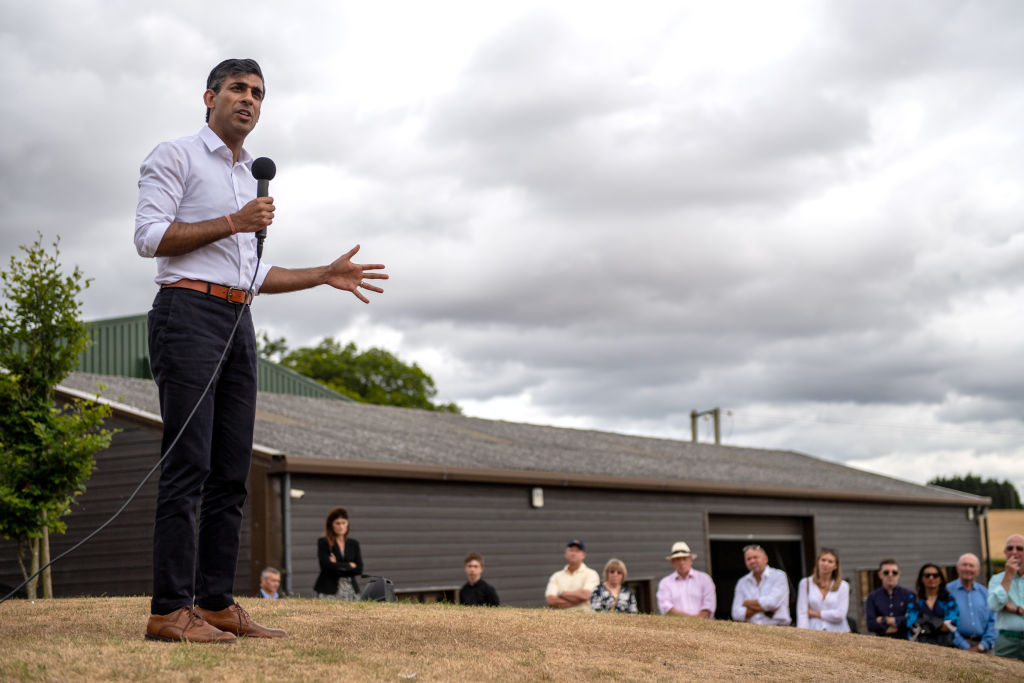From cityam.com
Gen V wants Rishi Sunak to go vegan. He should, but only to understand what our food system needs – with sustainable farming and lab-made meat as great alternatives to an army of vegans, writes Sascha O’Sullivan
There are a million reasons for Rishi Sunak to go vegan, and all of them are funded by Gen V, a non-profit promising to donate £1,000,000 to a charity of the prime minister’s choosing if he can abstain from animal products for a month.
The campaign was launched at the end of last year to be timed with ‘Veganuary’, but posters are still plastered all over London’s underground network.
And while I’m sure his chosen charity would enjoy the money, the real reason Rishi Sunak should go vegan is so he realises that most people won’t.
Going vegan is hard and no matter what you say, it’s more expensive. The cost of a litre of whole milk at Tesco is 60 per cent cheaper than the equivalent oat milk. There are cheaper non-dairy milks, but if you’ve ever made a coffee with Alpro’s almond milk, you’ll know how bland and watered down they are.
It is also time consuming. Preparing vegan meals, especially at the beginning, takes a lot more conscious effort. Many have the ability to do this, they have extra time on weekends or in the evenings to prepare nutritious animal-free food.
But as is the case with so many initiatives to make the UK a more sustainable place, it leaves those on the economic fringes behind because they are time poor, financially poor or, as is often the case, both.
Perhaps during the time he spends soaking his oats or whipping up a dahl, Sunak can consider the alternative to a mass-movement of vegans: sustainable farming.

You probably don’t need me to repeat the statistics the veggie lobby groups trot out from time to time, but I will anyway: livestock farming is responsible for about 15 per cent of man-made greenhouse gas emissions, it also requires a massive amount of land – around 85 per cent of the rolling British countryside – but it only accounts for 32 per cent of our calories.
There probably will be more people who go vegan as time wears on and more competition in the meat-free industry pushes prices down.
But farming will not disappear as an industry, even if it has disappeared from the agenda in Westminster.
During the Brexit years, sustainable farming practices was to be one of the freedoms we unleashed. The various reviews of the subsidy schemes have largely failed to create any perceptible change in Britain’s farming practices.
There are more sustainable farms in the UK. One of the biggest names is Daylesford Organic, the brainchild of Carole Bamford, the wife of Tory Party donor and JCB chair John Bamford. But even with a growth in sales, it haemorrhages cash – counting a pre-tax loss of £291,000 last year against £49.1m worth of sales. Only once has it scraped a profit – £9,000 in 2020 – and has had combined losses of £65m since first filing accounts in 2005.
Daylesford is only one example, but it shows how expensive it is to run a farm betting on people being able to fork out £8 for beef mince. And the farm in Gloucestershire has deep pockets behind it. Many others do not.
The pre-Brexit farming subsidies, which used to amount to more than £230 per hectare for your average 85 hectare farm, have been whittled down by 35 per cent and will cease entirely by 2027. One of the new schemes, for soil conservation, pays £22 per hectare. The idea behind the new rules was to stop the blunt per hectare measurement and instead give farmers “public money for public good”.
Public good includes things like sustainable farming, local nature restoration and landscape recovery, in a bid to restore the soil destroyed by conventional farming methods.
The former environment secretary George Eustice acknowledged the UK was “one of the most nature depleted countries in the world”.
There is a potential pot of gold to save Rishi from Britain’s food conundrum – lab-made meat. It’s an innovation which has managed to win the approval of people from across the political spectrum from the Institute of Economic Affairs to Guardian columnists. And the main stumbling block is a favoured enemy of the Conservative Party: EU-era red tape.
Rules still retained in UK law mean it takes years for firms to get approval, driving innovation and the possibility of cheap, sustainable meat alternatives from our shores.
So yes, Rishi Sunak should go vegan for a month, donate the million quid to Ukraine or the aid effort in Turkey and Syria, but he should use it to reflect on how much needs to be done to change the way we eat.
https://www.cityam.com/sunak-should-go-vegan-for-a-month-so-he-can-fix-britain-agriculture-industry/
No comments:
Post a Comment